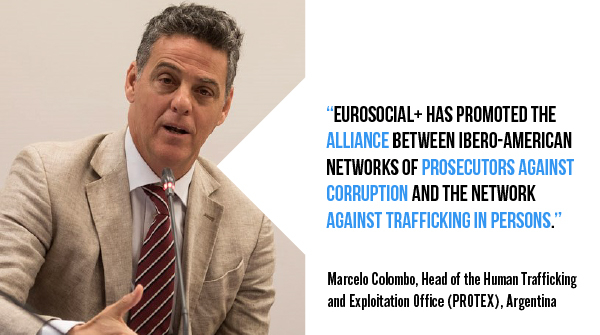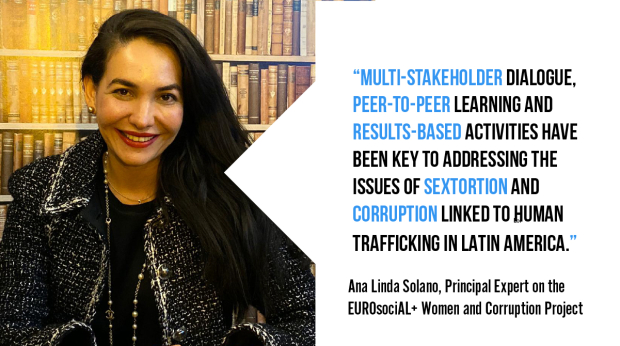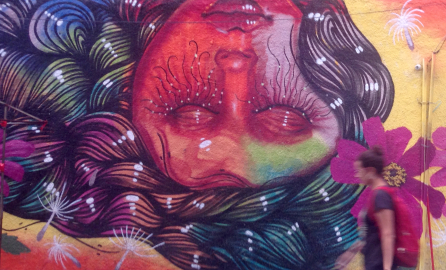Fighting ‘sextortion’ in Latin America
Article written by EUROsociAL+ Women and Corruption Project’s Team Leader, Borja Díaz Rivillas, and Principal Expert, Ana Linda Solano, with the support of the Capacity4dev editorial team.
Latin American countries are progressively incorporating a gender perspective into anti-corruption strategies. They are also developing specific tools to protect women and girls from gender-related violence. The European Union cooperation programme EUROsociAL+ is supporting this action through its initiative "Women and corruption".
Corruption is multifaceted and impacts differently on women and girls in Latin America. According to the Global Barometer of Corruption in Latin America and the Caribbean. in 2019, one in five women or girls experienced sexual extortion – known as ‘sextortion’ – that is, situations in which sexual favours are required to access public services (1).

Such practices are not always seen as forms of corruption. Worse still, they are sometimes socially accepted and normalised. Most of the time, they remain unpunished. There is a deep lack of trust in the authorities from the victims, and a lack of awareness of this issue from public officials. Consequently, this form of corruption often goes unnoticed and is therefore extremely difficult to address.
The objective of “Women and Corruption”, a project of the Democratic Governance area of the EU cooperation programme with Latin America EUROsociAL+, is to understand the impact of corruption on women and girls, and to promote strategies to combat this.
At national level, dialogues were initiated in Argentina, Peru, Chile and Guatemala. These have helped to place the issue on the international agenda and to create links between stakeholders.
Spaces for awareness, dialogue and the exchange of experiences

A key starting point of the project was to create spaces for dialogue and the exchange of experiences. EUROsociAL+ invited public institution networks, civil society, and international organisations working on corruption and gender equality policies. The objective was to share information and raise awareness of the scope and the nature of the issue of ‘sextortion’ in the region.
Fighting corruption and human trafficking
Corruption is one of the main facilitators of human trafficking. A transnational and interagency approach has been developed by EUROsociAL+ to promote collaboration between different prosecutors and investigative agencies, such as the alliance between the Ibero-American Network of Prosecutors against Corruption, and the Network of Human Trafficking and Smuggling of Migrants of AIAMP. As a result, prosecutors in Latin American countries are raising awareness. They are also developing specific strategies in Argentina, Chile, Paraguay, among others.

From regional to national scale: the case of Argentina:
In Argentina, with the support of EUROsociAL+, the Public Prosecutor's Office – composed of specialists in human trafficking and anti-corruption - has developed a tool which creates typologies and detects risks of corruption in cases of human trafficking for sexual exploitation.
Progress in the fight against sextortion
Educational campaigns and awareness-raising activities help to shed light on sextortion and to criminalise it. The Ibero-American Network of Prosecutors against Corruption is working to ensure that the fight against sexual corruption becomes public policy.
At national level, some countries are also beginning to take steps in that direction. In Peru, the High-Level Anti-Corruption Commission is addressing the criminalisation of sexual extortion in its first anti-corruption plan with a gender perspective. The debate is also opening up in Chile. In Guatemala, the Public Prosecutor's Office created a Corruption and Gender Round Table to tackle this specific type of crime.
(1) According to the United Nations Office on Drugs and Crime (UNODC) corruption also plays an important role in facilitating and fostering trafficking in persons, a crime that mostly affects women and girls
Read the original article written by EUROsociAL+ Women and Corruption Project’s Team Leader, Borja Díaz Rivillas, and Principal Expert, Ana Linda Solano, with the support of the Capacity4dev editorial team at Voices & Views section here
Credit: Videos © Capacity4dev | Photo ©Borja Diaz Rivillas
